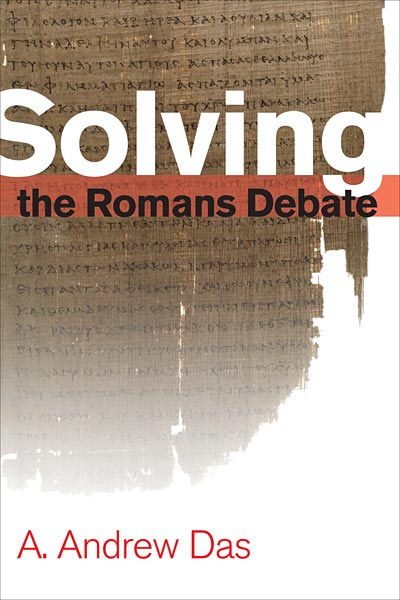Book Review—Solving the Romans Debate
Solving the Romans Debate by A. Andrew Das. Minneapolis: Fortress Press, 2007. 324 pages. $24.00/Paperback. Purchase: Augsburg/Fortress, CBD, Amazon
Purchase: Augsburg/Fortress, CBD, Amazon
Special Features: Bibliography, Author Index, Subject Index, Primary Source Index.
ISBNs: 9780800638603 / 080063803
LCCN: BS2665.6.J4D37
DCN: 227’.106—dc22
Subject(s): Audience of Romans, Purpose of Romans
Ajit Andrew Das currently presides as an Associate Professor, holding the Niebuhr Distinguished Chair of Theology and Religion, at Elmhurst College. Dr. Das has published numerous books and articles centering on New Testament theology and introductory related issues.
In Solving the Romans Debate, Das contributes to the area of Romans study by taking an in-depth look at the audience to which Paul was writing. The focus of Das’ study is to show that Paul wrote to an entirely Gentile audience. While some aspects of this study do not appear to hold much weight, there are many sections of this book that are highly valuable to Romans study.
Das begins explaining the current situation of the debate at hand and the various positions other scholars hold. The book is organized into five chapters, each dealing with specific aspects of the debate. Das uses the first chapter to present his basic argument and to show that a mixed group of recipients is questionable. The second chapter focuses on the internal evidence of the letter. Das presents his main theory here. He holds that there was a group of Gentiles who feared God, knew of the Mosaic Law, and followed portions of it. The third chapter of the book is devoted to explaining who these Gentile God-fearers were and what their significance was to the church in Rome. The forth chapter deals exclusively with the Edict of Claudius and its possible ramifications. In the final chapter, Das focuses on two key passages in Romans and their implications to a Gentile audience.
The entire argument focuses around one key assumption: the existence of Gentile God-fearers in the Roman church. Das devotes large sections of his book to proving not only that God-fearing Gentiles existed but also that they were the weak in Romans 14-15. The problem with this approach is that a hypothetical subgroup has been created to support his claim. From a biblical standpoint, we do know that certain Gentiles did fear God (i.e., Cornelius in Acts 10). However, this is not sufficient evidence to claim that they existed throughout the Roman Empire.
To support his theory of God-fearing Gentiles in Rome, Das devotes an entire chapter to the Edict of Claudius. This chapter is filled with a wealth of historical information and is definitely a strength of this study. In this chapter, Das explores the possible reasons for the Jews’ expulsion out of Rome and the broader implications the expulsion had on the church. Furthermore, he provides great insight into the mindset of first-century Judaism and how this mindset led to the Edict (pp. 193-197)
An additional strength of Das’ study is found in his contributions to Romans 11:25-26. Here he interacts with N.T. Wright’s position that “all Israel will be saved,” referring to both Jews and Gentiles. Contra Wright, Das contends that the salvation of “all Israel” is a future event that does not detract from the reality of the present situation. Romans 9:1-5 is not a “sham.” Romans 10:1 is no “mere formality” (p. 240). Das expertly defines “all Israel” as “a corporate expression that does not mean every Israelite who ever lived or even every Israelite at the time when ‘all Israel’ is saved. The phrase never emphasizes individuals but rather the fullness of Israel’s idealized Twelve-tribal structure” (p. 256).
As mentioned above, a significant weakness in Das’ study deals with assumptions. A major problem with this study is that he repeatedly presents speculation as fact. For instance, “Just prior to 7:1, in 6:9, Paul identifies his audience as former slaves to ‘impurity’ and greater ‘lawlessness.’ Impurity and lawlessness would better describe God-fearers of the Law rather than Law-observant Jews (p. 85).” What Das has done is place speculation on a supposed theory and afterward presents the completed package as fact and proof of a Gentile audience.
An additional weakness pertains to his handling of Romans 7:7-25. Das correctly concludes that Paul’s argument centers on whether the Law is sinful. Yet Das goes on to explain that “I” in Paul’s discourse does not refer to his own experience but to that of a Gentile. Das contends that “I” describes “Paul’s readers as they find themselves as God-fearers under sin and the Law” (p. 234) and that this is why Paul responded with an answer in Romans 8:2. The problem here is that Das removes the personal nature of Romans 7 to favor his theology without allowing the text to speak for itself.
Overall, Das contributes a well-researched study into the argument surrounding the recipients of the Roman epistle. Solving the Romans Debate will benefit any seminary student who wants to gain a better understanding of the differing views surrounding the Roman audience. In addition, the chapter on the Edict of Claudius provides a wonderful amount of information to any student of history concerning the social interactions between the Jews and Romans.
Das expertly ties his thoughts together as follows:
Paul’s expectations have profound implications for a Gentile readership.… For the Gentile audience, this question is of supreme relevance: what value is there in this strange, eastern, barbaric heritage? Does faith in Christ render ethnic Israel essentially a relic, a thing of the past? The Gentiles dare not think that they have replaced ethnic Israel… . The apostle is removing any possibility of Gentile superiority over the Jews. Gentiles depend on the Jewish tree and its root structure. The Gentile branches do not support the Jewish roots, but rather their roots support the Gentile branches. The Gentiles are benefiting from God’s promises to Israel. The Jew remains “first” (Rom 1:6). Gentile engrafting is a matter of unmerited grace (11:20; cf. 9:18; 9:30-32; 10:9; 11:5-6), but the future belongs to Israel (pp. 259-260).
In conclusion, while my views on the audience have not changed, I personally have benefited from Das’ study. I have discovered that challenging one’s position on certain matters can be a highly beneficial experience. While I disagree with his stance on the recipients of Paul’s letter, I did gather helpful nuances into a deeper understanding of Romans.
 Stewart MacLean Jr. teaches Music K-8 at the Hope of Detroit Academy (Detroit, MI) and provides woodwind instrument classes for Detroit intercity youth through the Southeastern Michigan Arts Forum. Stewart is a Member of Lakes Baptist Church (Walled Lake, MI) and holds a B.A. in Music Education from Wayne State University (Detroit, MI) and an M.A. in Biblical Studies from Northland Baptist Bible College (Dunbar, WI). Stewart is currently pursing a Master of Divinity from Faith Baptist Theological Seminary (Ankeny, IA). Visit his blog. Stewart MacLean Jr. teaches Music K-8 at the Hope of Detroit Academy (Detroit, MI) and provides woodwind instrument classes for Detroit intercity youth through the Southeastern Michigan Arts Forum. Stewart is a Member of Lakes Baptist Church (Walled Lake, MI) and holds a B.A. in Music Education from Wayne State University (Detroit, MI) and an M.A. in Biblical Studies from Northland Baptist Bible College (Dunbar, WI). Stewart is currently pursing a Master of Divinity from Faith Baptist Theological Seminary (Ankeny, IA). Visit his blog. |
- 13 views


Discussion